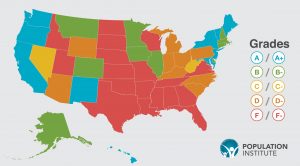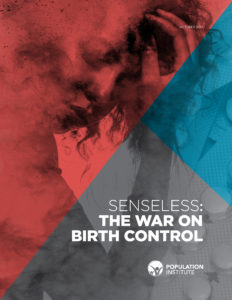The Population Institute mourns the loss of David Poindexter. A former colleague, David championed the use of radio and television serial dramas to promote family planning, gender equity, and protection of the environment. He died February 8 at a hospital in Portland, Oregon, after suffering a stroke. He was 89.
David was Director of the Communication Center at the Population Institute from 1970 to 1985. In that capacity, and in his later work, he promoted the use of radio and television entertainment programs to promote gender equality and use of family planning, employing a methodology originally designed by Miguel Sabido in Mexico during the 1970s. Sabido, who was Vice President of Televisa oversaw the creation of a series of telenovelas, serial dramas, which were credited for boosting public acceptance of family planning in Mexico. David was successful in introducing Sabido and his methodology to India, as as well as, other parts of Latin America.
At the Population Institute, and later as founder and President of Population Communications International (1985-1998), David was instrumental in the creation of social content serial dramas in numerous countries, including Brazil, China, Kenya, Madagascar, Namibia, Nigeria, Pakistan, the Philippines, St. Lucia, and Tanzania.
Poindexter served as Honorary Chair of Population Media Center, where he helped establish new programs in Ethiopia and Nigeria. He continued in this role until his death, during which time Population Media Center implemented social change serial dramas in 54 countries.
David also chaired the U.S. NGO Committee for the UN Population Conference in 1974, held in Bucharest, Romania. He also served as Convener of the NGO Planning Committee for the 1984 Population Conference, held in Mexico City and as Convener of the NGO Planning Committee for the 1994 UN Conference on Population and Development, held in Cairo. The 1994 NGO Forum became the largest NGO forum in UN history.
Obituary

David Poindexter
(1929-2018)
David Oldham Poindexter, a Methodist minister who championed the use of radio and television serial dramas to promote family planning, gender equity, and protection of the environment, died February 8 at a hospital in Portland, Oregon. He died from the effects of a stroke. Poindexter, who also organized several non-governmental organization (NGO) forums at major UN conferences, was born in Hood River, Oregon in 1929.
After receiving a Bachelor’s of Art at Willamette University in 1951 and both Bachelor’s and Master’s degrees in Theology at Boston University (where he became friends with Dr. Martin Luther King, Jr.), David served as pastor of Parkrose Heights Methodist Church in Portland for eight years. He then moved to New York City to work with the National Council of Churches for five years as Director of Utilization of the NCC’s Broadcasting and Film Commission and then Director of Promotion Services, during which he established close ties with the Hollywood community.
At the request of his bishop, David became Director of the Communication Center of the Population Institute from 1970 to 1985. In the early1970s, he collaborated with John D. Rockefeller III to hold a meeting of the three network CEOs – a meeting also attended by then UN ambassador George H.W. Bush and Senator Robert Packwood – to discuss treatment of gender, reproductive health and family planning issues in television. He convinced the CEOs of the three major networks to host a large gathering in New York of key network entertainment producers and writers. Following that event, he organized annual awards ceremonies in collaboration with the National Academy of Television Arts and Sciences to recognize the best entertainment shows addressing those issues.
One of the outgrowths of Poindexter’s outreach to Hollywood leaders was a long-standing relationship with Norman Lear and his head of drama, Virginia Carter. At Poindexter’s suggestion, the character Maude, in the series by the same name, had a mid-life abortion – six months before the Roe vs. Wade decision by the U.S. Supreme Court. As Norman Lear later put it, “David got Maude pregnant.” Similarly, he suggested the vasectomy of Rob Reiner’s character, Michael, on All in the Family. During his work in Hollywood, Poindexter worked closely with Mary Tyler Moore, who was a great supporter of his work, which helped to bring about the discussion of sexism in the workplace on the Mary Tyler Moore Show.
In the mid-1970s, Poindexter began working in Mexico, where he discovered and promoted the work of Miguel Sabido, a well-known Mexican playwright and television producer who became a pioneer in entertainment-education. As Vice President of Televisa, Sabido produced six telenovelas in the late 1970s and early 1980s, modeling family planning use for Mexican audiences. During that time, Mexico experienced the most rapid decline in fertility rate of any developing country in the 20th century up until that time. These programs had similar effects when they were broadcast in several in Spanish-speaking countries in Latin America. Thomas Donnelly, then with USAID in Mexico, wrote, “The Televisa family planning soap operas have made the single most powerful contribution to the Mexican population success story.”
In the early 1980s, Poindexter took Sabido to meet with Indian Prime Minister Indira Gandhi, and following a training program they organized for Doordarshan (Indian Television), the country began broadcasting India’s first social content soap opera, Hum Log (“We People”) in July 1984. The program included promotion of family planning and elevation of the status of women through the words and actions of key characters. Research conducted by the Annenberg School for Communication and Journalism of the University of Southern California, found dramatic impacts on audience attitudes about women’s rights and ideal family size. The program spurred over 400,000 people to write letters to the Indian Television Authority.
In 1986, Poindexter, with commercial sponsorship from India’s largest industrial conglomerate, helped to organize a second serial drama, which aired in January 1992. Produced by Roger Pereira, Humraahi (“Come Along With Me”) dealt with child marriage, age of first pregnancy, gender bias in childbearing and child rearing, equal educational opportunity, and the right of women to choose their own husbands. A Rockefeller Foundation-funded study showed that viewers, contrasted with non-viewers, changed significantly in their attitudes regarding the ideal age of marriage and the acceptability of women in the work place.
At the Population Institute, and later as founder and President of Population Communications International (1985-1998), Poindexter worked to bring about similar programs in numerous countries, including Brazil, China, Kenya, Madagascar, Namibia, Nigeria, Pakistan, the Philippines, St. Lucia, and Tanzania.
Following retirement in 1998, Poindexter served as Honorary Chair of Population Media Center, where he helped establish new programs in Ethiopia and Nigeria. He continued in this role until his death, during which time Population Media Center implemented social change serial dramas in 54 countries.
Poindexter chaired the U.S. NGO Committee for the UN Population Conference in 1974, held in Bucharest, Romania. He also served as Convener of the NGO Planning Committee for the 1984 Population Conference, held in Mexico City and as Convener of the NGO Planning Committee for the 1994 UN Conference on Population and Development, held in Cairo. The 1994 NGO Forum became the largest NGO forum in UN history.
For over a decade, he was an officer of the Committee on Sustainable Development of the Conference of Non-Governmental Organizations in Consultative Status with the UN’s Economic and Social Division. He also served on the Executive Committee of the Conference of UN Representatives of the Council of Organizations of the United Nations Association-USA (UNA-USA). He was an Honorary Fellow of the Population Reference Bureau, and received the Ninoy Aquino Human Rights Award, an Alumni Citation from Willamette University, the Eleanor Schnurr Award of the UNA-USA, and the Distinguished Service Award of the Population Institute. He was an Honorary Life Board Member of the Council on International Non-Theatrical Events (CINE).
Poindexter’s life and work are captured in his autobiographical book, Out of the Darkness of Centuries, published in 2009.
David is survived by his wife of 65 years, Marian Sayer Poindexter, and his son, Jim.
A memorial service will be held on Tuesday, February 13, at the First United Methodist Church, at 1838 SW Jefferson Street, Portland, Oregon 97201 at 10:30 am.
In lieu of flowers, memorial contributions may be made to Population Media Center, Suite 302, 30 Kimball Avenue, South Burlington, Vermont 05403.


